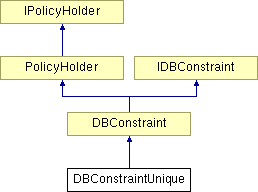DBConstraintUnique Class Reference
[Model]
A unique constraint. More...
Inheritance diagram for
DBConstraintUnique:

Public Member Functions |
|
| validate ($arr_fields, $key_fields) | |
| Check if constraints are fullfiled. |
|
Detailed Description
A unique constraint.
Definition at line 8 of file dbconstraint.unique.cls.php.
Member Function Documentation
| DBConstraintUnique::validate | ( | $ | arr_fields, | |
| $ | key_fields | |||
| ) |
Check if constraints are fullfiled.
- Parameters:
-
array Associative array of form fieldname => fieldvalue
- Returns:
- Status
Reimplemented from DBConstraint.
Definition at line 15 of file dbconstraint.unique.cls.php.
00015 { 00016 $ret = new Status(); 00017 00018 $dao = DB::create($this->tablename); 00019 $query = new DBQuerySelect($dao); 00020 $query->set_fields(array('count(*)' => 'c')); 00021 00022 // Set unique conditions 00023 $unique_fields = $this->get_fields(); 00024 foreach($unique_fields as $col_name) { 00025 $col_value = Arr::get_item($arr_fields, $col_name, null); 00026 $query->add_where($col_name, '=', $col_value); 00027 } 00028 00029 // Add keys 00030 foreach($key_fields as $col_name => $col_value) { 00031 if (!is_null($col_value)) { 00032 $query->add_where($col_name, '!=', $col_value); 00033 } 00034 } 00035 00036 $result = DB::query($query->get_sql(), $dao->get_table_driver()); 00037 $arr_result = $result->fetch(); 00038 00039 if ($arr_result['c'] > 0) { 00040 $num_unique_fields = count($unique_fields); 00041 $tr_unique_fields = array(); 00042 foreach($unique_fields as $col_name) { 00043 $tr_unique_fields[] = tr($col_name, 'global'); 00044 } 00045 $err_msg_fields = implode(', ', $tr_unique_fields); 00046 00047 if ($num_unique_fields == 1) { 00048 $ret->append(tr( 00049 'There are already records for the provided value of %field', 00050 'core', 00051 array( 00052 '%field' => $err_msg_fields 00053 ) 00054 )); 00055 } 00056 else { 00057 $ret->append(tr( 00058 'There are already records for the given combination of %fields', 00059 'core', 00060 array( 00061 '%fields' => $err_msg_fields 00062 ) 00063 )); 00064 } 00065 } 00066 00067 return $ret; 00068 }
The documentation for this class was generated from the following file:
- gyro/core/model/base/constraints/dbconstraint.unique.cls.php
